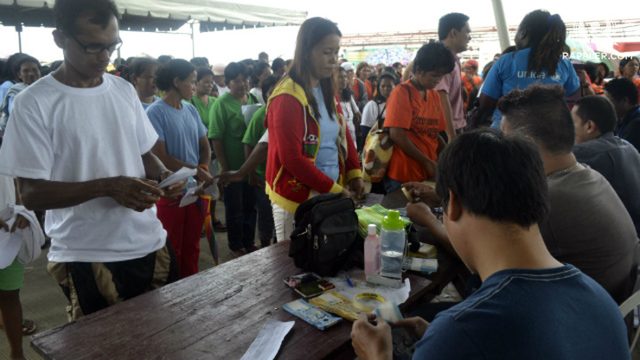SUMMARY
This is AI generated summarization, which may have errors. For context, always refer to the full article.

MANILA, Philippines – The Senate on Monday, February 4, approved on 3rd and final reading the bill that would institutionalize the government’s conditional cash transfer program, the Pantawid Pamilyang Pilipino Program (4Ps).
Voting 18-0, senators passed Senate Bill 2117, which was sponsored and authored by detained Senate committee on social justice, welfare, and rural development chairperson Leila de Lima. Senator Antonio Trillanes IV, as vice chairman of the committee, sponsored the measure on the floor.
De Lima said “cutting the cycle of poverty” and “giving the poor the ability to improve their lives” would enable them to contribute to the country’s development.
Trillanes, for his part, said that the measure aims to help poor families become self-sufficient through sustained income and livelihood opportunities.
“The 4Ps Act can be a transformative program that will improve the lives of not only the 4.4 million beneficiaries across the country it currently serves, but the remaining fraction of poor families we wish to be covered in the coming years,” Trillanes said.
The program provides conditional cash transfers to poor households for a maximum period of 7 years to improve their health, nutrition, and access to education.
Under the bill, the Department of Social Welfare and Development (DSWD) shall conduct and revalidate qualified beneficiaries using a standard targeting system every 3 years.
Among those considered eligible for the program are those from the informal sector, homeless families, indigenous peoples, and those living in isolated and disadvantaged areas.
All beneficiaries shall also be automatically covered in the National Health Insurance Program.
Qualified beneficiaries may also avail of livelihood programs offered by the DSWD, the Department of Labor and Employment, and other government agencies or accredited private institutions.
Conditions
Under the bill, the following conditions are sought to ensure compliance with the program:
- Pregnant women must avail of pre-natal services, give birth in a health facility attended to by a skilled health professional, and receive after-care for them and their newborns
- Children from 0 to 5 years old must receive regular health and nutrition services including checkups and vaccinations
- Children one to 14 years old must avail of deworming pills at least twice a year
- Children 3 to 4 years old must attend day care or preschool classes at least 85% of the time, while children 5 to 18 years old must attend elementary or secondary classes at least 85% of the time
- At least one responsible person must attend development sessions conducted by the DSWD at least once a month.
Failure to comply with the conditions would cause the immediate termination of cash grants to the beneficiary.
Aside from De Lima, SB 2117 was also authored by Senate President Pro Tempore Ralph Recto, Minority Leader Franklin Drilon, and senators Loren Legarda, Joel Villanueva, Juan Edgardo Angara, Paolo Benigno Aquino IV, Risa Hontiveros, Joseph Victor Ejercito, Sherwin Gatchalian, Cynthia Villar, and Nancy Binay.
The House approved a counterpart measure in August 2018. A bicameral conference committee will be convened to thresh out differences between the two versions.
The conditional cash transfer program was first introduced during the presidency of Speaker Gloria Macapagal Arroyo. It was then continued by former president Benigno Aquino III.
Aquino turned the 4Ps into his administration’s flagship anti-poverty program. But the program has long been under scrutiny because of the huge annual budget allocations and the alleged flaws in the roster of beneficiaries. (READ: FACT CHECK: How 4Ps funds are paid out to beneficiaries) – Rappler.com
Add a comment
How does this make you feel?
There are no comments yet. Add your comment to start the conversation.